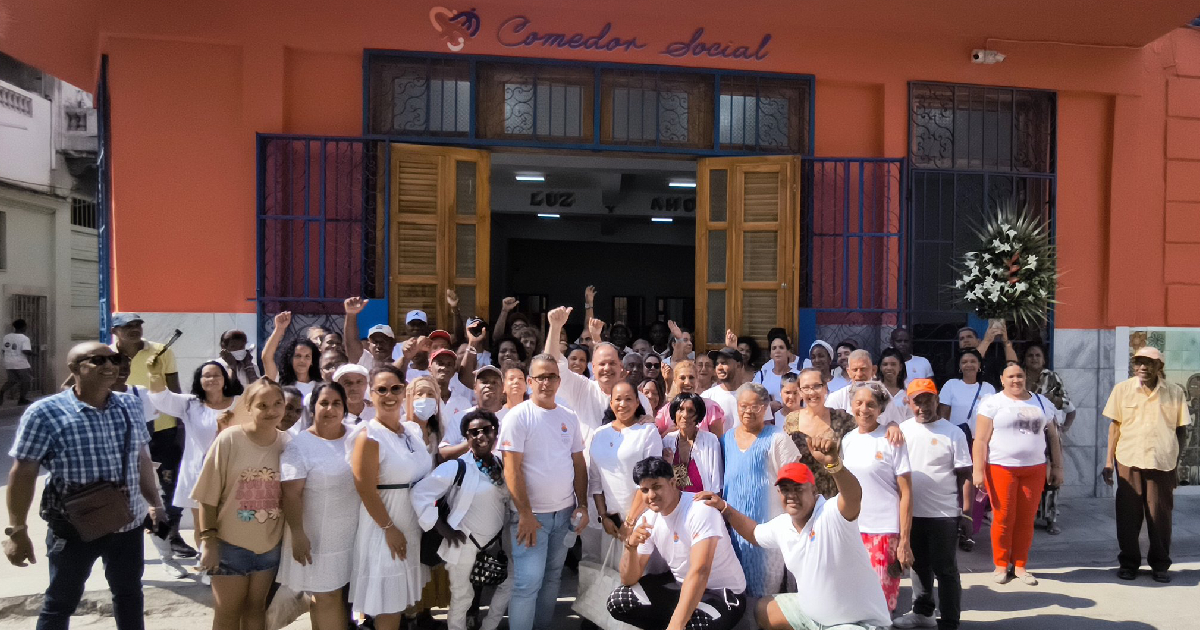
After his associates meeting, the Cabildo Quisicuaba sociocultural project, a Cuban spiritualist association, promised to save the revolution, although without delving into the supposed dangers it faces.
“The General Meeting of Associates of the Quisicuaba Religious Institution was held. We ratify our commitment due to a spiritualist vocation to save the homeland, the revolution and socialism,” they said in a publication on the X social network.
Quisicuaba is an association with verifiable links with the senior leaders of the Cuban government leadership.. The visits of the designated president Miguel Díaz-Canel, government ministers and state officials leave a mark of these ties.
The first to congratulate them, after the aforementioned meeting, was Lis Cuesta Pedraza, the wife of the Cuban ruler, who in a response message entertained them for their event.
According to a report from the digital portal 14 and a half Every time they attend to the media there, even international ones, “the Government praises the ‘social’ work of Quisicuaba.”
Your director Enrique Alemán, who, in addition to being a spiritualist, is deputy to the National Assembly of People's Power (ANPP), has expressed that this social work of Qusicuaba is justified in the work with the impoverished population groups of the capital, a number that is increasingly growing on the island.
Alemán has said that, in a report on the official portal Cubadebate, what offers meals to more than 4,000 homeless people and “vulnerable” people a day in a dining room in Havana.
However, by echoing that figure, 14 and a half specifies that If this figure were true, it would mean feeding three people per minute for 24 hours a day in a row..
Its soup kitchen is located on Maloja Street, in Centro Habana., and “strives to ensure that the regime is not left in a bad light.”
They also have an “assisted living center” in San Antonio de los Baños, province of Artemisa, which they built from an abandoned rural high school, where 113 people reside and they hope to soon receive another 24. Everyone was previously served in the Havana dining room and after the opening of the “camp” they arrived at the facilities.
“One of our fundamental premises lies in self-sufficiency, including our soup kitchen. For this we request idle land from agriculture and we already produce charcoal for cooking food. In addition, we harvest banana, sweet potato, taro, pumpkin, cassava and beans. We also have an organoponic and a livestock module,” he said. Yadelkis Hernandez Morales, the director of the center.
In the words of these officials, Quisicuaba does not represent an economic dependent of the government, although he leaves some symbolic credits that the representatives of the regime take advantage of in their favor.
In a 2021 report, published in the official newspaper Workers, Alemán pointed out that they have “accompanied the work of the Revolution, hence our effort to help others, especially the elderly, single mothers, homeless people, men and women with HIV. From the outside they identify us as a project, but here inside our essence is the practice of goodness and love of neighbor.”
However, despite the altruism that Quisicuaba endorses, the growth of beggars and poor people in Cuba is a situation that exceeds his efforts.
Although close to the regime, the members of this social project with a political nature should know that, according to the Ministry of Labor and Social Security (MTSS), In Cuba, 3,690 homeless people have been registered between 2014 and 2023.
A masked figure that does not include those who, for different reasons, have had to resort to begging in front of churches, or before the few tourists, who come to the Caribbean island every year. Nor are there those who, due to high prices, food shortages and low salaries in pensions, have had to resort to “diving” in the garbage, in search of sustenance for their fragile stomachs.
Definitely, numbers are a necessary ally to support all these arguments, especially when you take into account that In the 2012 Population and Housing Census, the last one carried out in Cuba, more than 1,100 people were counted living on the streets.. By 2015, the number increased to 1,261, according to a newspaper report. Workers.
For its part, the Cuban Observatory of Human Rights (OCDH) denounced in September 2023, the worrying increase in extreme poverty in Cuba.
The non-governmental organization detailed in the VI Report on the State of Social Rights in Cuba, that "88% of Cubans live in extreme poverty, 13% more than in 2022."
What do you think?
COMMENTFiled in: